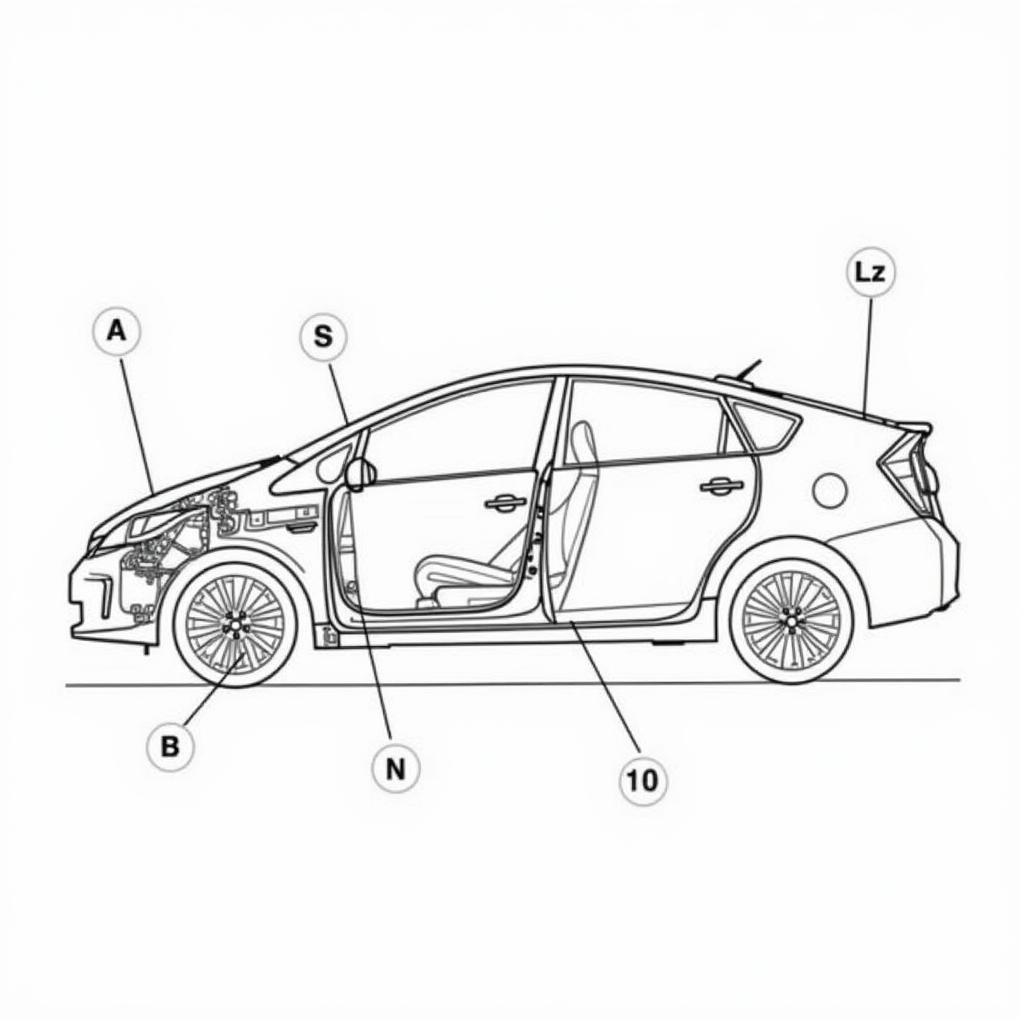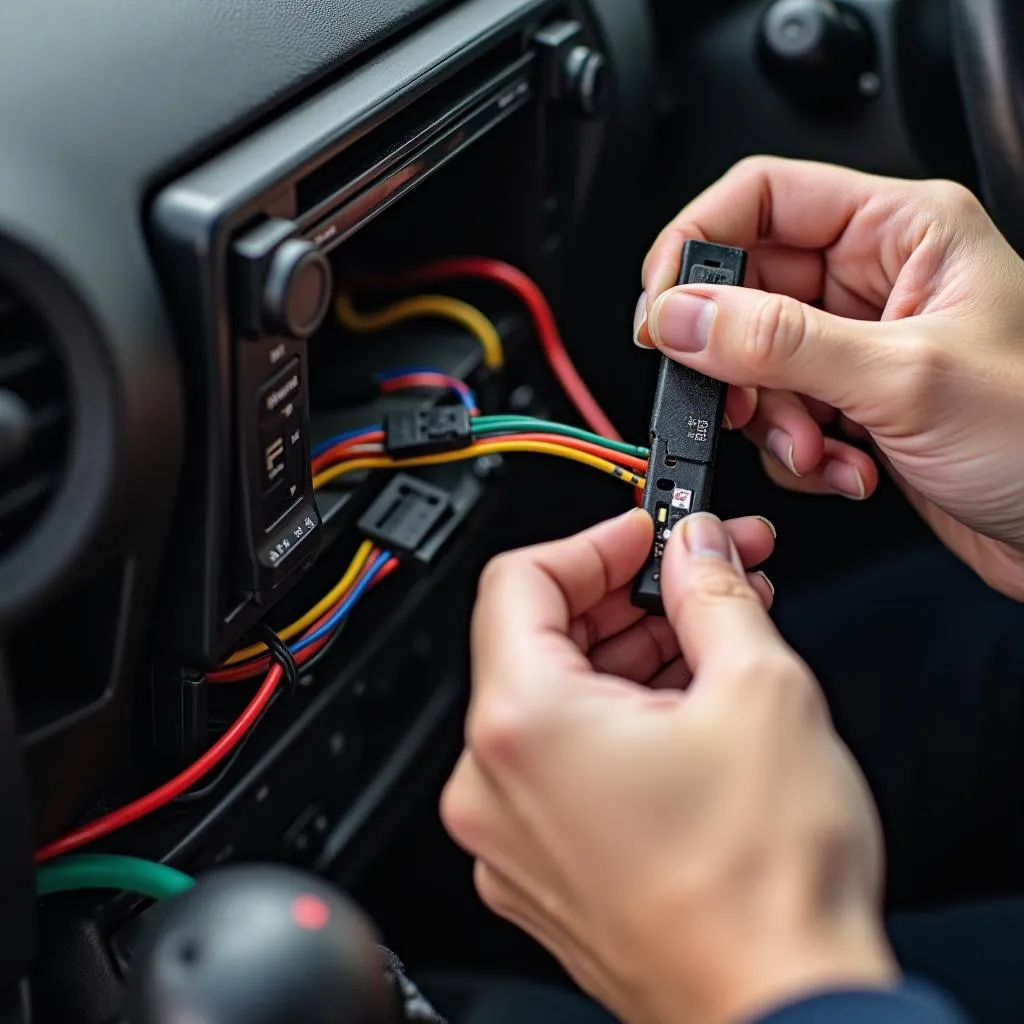The brake warning light on your 2008 Toyota Prius is a crucial safety feature that shouldn’t be ignored. While it’s designed to illuminate when you engage the parking brake, it can also indicate a range of potential problems within your vehicle’s braking system. This comprehensive guide will delve into the common causes of a 2008 Prius brake warning light, how to diagnose the issue, and potential solutions to get you back on the road safely.
Understanding Your Prius’s Brake Warning Light System
Before diving into troubleshooting, it’s important to understand how your Prius’s brake warning light system functions. The light itself is connected to several components:
- Parking Brake: The light illuminates when the parking brake is engaged.
- Brake Fluid Level Sensor: If the brake fluid level drops below a safe threshold, the sensor triggers the warning light.
- Brake Pad Wear Sensors: Some Prius models are equipped with sensors that monitor brake pad wear. When the pads wear down to a certain point, the sensor activates the warning light.
- Anti-lock Braking System (ABS): The ABS system ensures your wheels don’t lock up during hard braking. If a fault is detected within the ABS system, the brake warning light may illuminate along with the ABS warning light.
Common Causes of a 2008 Toyota Prius Brake Warning Light
Here are some of the most frequent reasons why your 2008 Prius brake warning light might be on:
1. Engaged Parking Brake
This is the most straightforward cause. Always double-check that your parking brake is fully disengaged before moving your Prius.
2. Low Brake Fluid
Brake fluid is essential for transmitting the force you apply to the brake pedal to the wheels, allowing you to stop. If the brake fluid level is low, it could indicate a leak in the system or worn brake pads.
What to do: Check your brake fluid reservoir. It’s located under the hood on the driver’s side. If the fluid level is low, add brake fluid that meets the specifications outlined in your owner’s manual. It’s important to note that simply adding fluid doesn’t address the underlying problem. If you notice a consistent need to top off your brake fluid, consult a mechanic to diagnose and repair any leaks.
3. Worn Brake Pads
Brake pads are designed to wear down over time. If your Prius has brake pad wear sensors, the warning light will illuminate when the pads reach a critical thickness.
What to do: If your brake pads are worn, it’s essential to have them replaced promptly by a qualified mechanic. Driving with worn brake pads can significantly reduce your braking efficiency and potentially lead to more costly repairs.
4. Faulty Brake Light Switch
The brake light switch activates your brake lights when you press the brake pedal. A malfunctioning switch can cause a range of issues, including a brake warning light, brake lights that stay on constantly, or brake lights that don’t illuminate at all.
What to do: Diagnosing a faulty brake light switch often requires a multimeter to test for continuity. If you’re not comfortable with electrical diagnosis, it’s best to have a mechanic inspect and replace the switch if necessary.
5. ABS Issues
While less common, a problem with your Prius’s ABS system can also trigger the brake warning light. This is often accompanied by the illumination of the ABS warning light.
What to do: ABS issues can stem from a variety of factors, including faulty wheel speed sensors, problems with the ABS module, or wiring issues. Due to the complexity of the ABS system, it’s recommended to have a mechanic diagnose and repair any problems.
 Components of the 2008 Prius ABS system
Components of the 2008 Prius ABS system
Diagnosing a 2008 Prius Brake Warning Light with Remote Diagnostics
Modern automotive technology allows for remote diagnostics, offering a convenient and efficient way to pinpoint the cause of your 2008 Prius brake warning light. By connecting your vehicle to a specialized diagnostic tool, experienced technicians can remotely access your car’s computer system, read fault codes, and analyze real-time data to identify the root of the problem.
Benefits of Remote Diagnostics:
- Convenience: No need to physically take your car to a shop.
- Speed: Diagnostic scans can be performed quickly and efficiently.
- Accuracy: Advanced diagnostic tools provide precise information about the issue.
- Cost-effective: Can potentially save on diagnostic costs compared to traditional methods.
“Remote diagnostics allowed me to quickly pinpoint the cause of a 2008 Prius brake warning light without the car even being in our shop. The brake light switch was faulty, and we were able to guide the owner through a simple replacement over a video call.” – [Name of Expert], Senior Automotive Technician at [Company Name]
Conclusion
Addressing a 2008 prius brake warning light is crucial for your safety and the longevity of your vehicle. While some causes, like an engaged parking brake or low brake fluid, are relatively simple to address, others require the expertise of a qualified mechanic, especially when dealing with the ABS system or electrical components. Remote diagnostics can be a valuable tool in quickly and accurately identifying the problem, potentially saving you time and money in the long run. Remember, never ignore a brake warning light; address it promptly to ensure your safety on the road.

